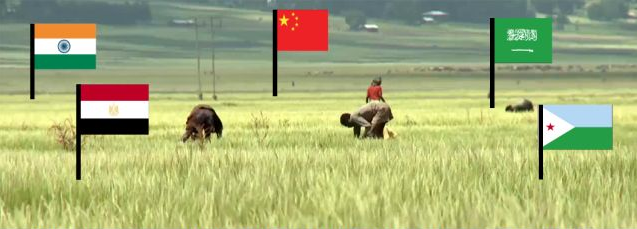“Happy at last !”
making millions on the back of the starving Ethiopians .
A new form of feudal system and slavery in the 21st century…
The Criminal land Grabber of Ethiopia

The Criminal Ethiopian land Grabber Mohammed Ali Al-Amoudi’s recently established Saudi Star Agricultural Development Plc requested, two weeks ago, for an additional 250,000ht of land in Jawi Wereda of the Awi Zone of the Amhara Regional State for sugar beet production from the Ministry of Agriculture and Rural Development (MoARD).
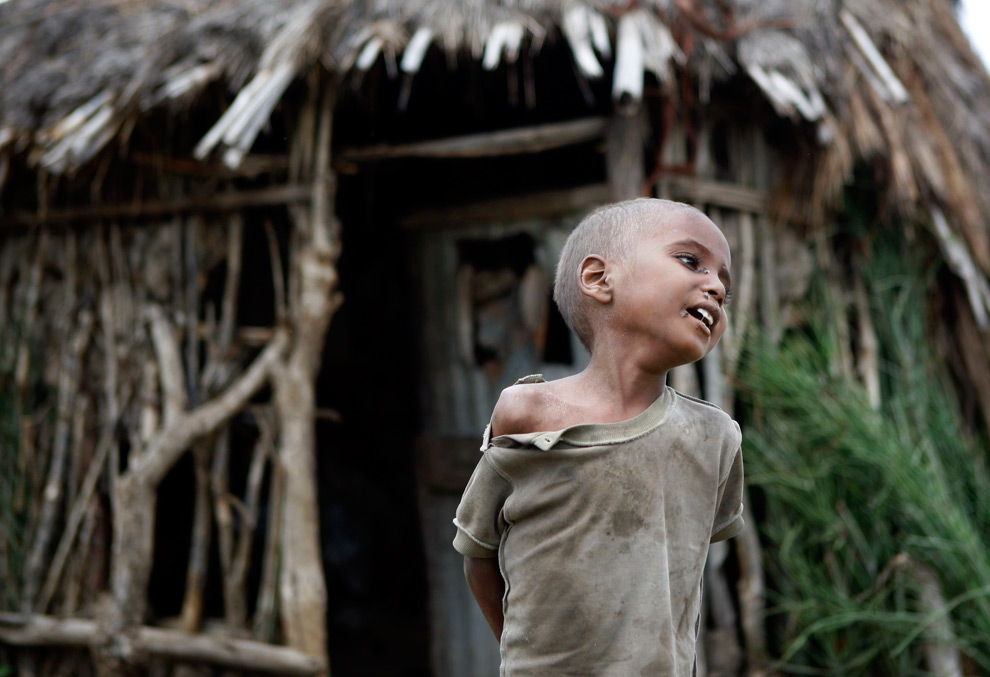

The second scramble for Africa starts
BY JULIO GODOY | LAST UPDATED: MAY 5, 2009 – 3:45:49 PM
BERLIN (IPS) – Sub-Saharan African countries have of late become the target of a new form of investment that is strongly reminiscent of colonialism: investors from both industrialized and emerging economies buy or lease large tracts of farm land across the continent, either to guarantee their own food provisions or simply as yet another business.
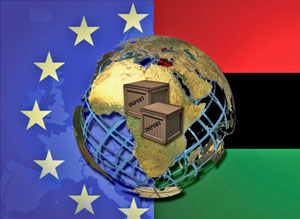
In doing so, investors even deal with warlords who claim property rights, as in Sudan.
Non-governmental organizations (NGOs) and activists in Europe are denouncing this land grab in Egypt, Sudan, Cameroon, Senegal, Mozambique and elsewhere in Africa as a new form of colonialism.
Uwe Hoering, a German researcher on development policy for several European NGOs, including the news letter Weltwirtschaft und Entwicklung (World Economy and Development), called these investments ‘‘a new form of agrarian colonialism”.
In an interview with IPS, Hoering said that the land grab in Africa became evident in 2008 as a consequence of the recent run to so-called bio fuels and the price inflation and scarcity of food.
Although the investments are also targeting fertile land in other areas of the world, sub-Saharan Africa appears to be these investors’ main destination. The reasons are multiple.
On the one hand, ‘‘Africa possesses enormous land reserves,” Hoering stated. ‘‘According to the United Nations’ Food and Agricultural Organization, only about 14 percent of the suited land in the continent is presently cultivated.”
In addition, he said, many African governments are willing to allow this land grab to happen in their territories.
A list of the land grab investments of 2008 have been put together by the Barcelona-based NGO GRAIN, based on corporate reports.
It confirms that several industrialized countries, like Japan and Sweden, rapidly growing developing nations, like China and India, and oil-rich countries, especially from the Arab Gulf, and even Libya, are buying large estates in Africa.
GRAIN is an international NGO committed to promoting sustainable management and use of agricultural biodiversity based on people’s control over genetic resources and local knowledge.
GRAIN also lists multinational private investors, like the Blackstone Group, Deutsche Bank, Goldman & Sachs and Dexion Capital, as participating in the creation of these new agrarian enclaves in the heartlands of Africa.
Even private industrial conglomerates, such as the South Korean Daewoo, are also investing in land in Africa.
‘‘In July 2008, Daewoo leased 1.3 million hectare in Madagascar to cultivate maize and palm oil,” Hoering said. ‘‘Daewoo paid a symbolic price for the land. Allegedly, as compensation for the land lease, it is going to invest in public infrastructure.”
This deal has since been called off by the country’s new leader, Andry Rajoelina, who replaced Marc Ravalomanana in a coup.
Unsurprisingly, the investors interested in land deals include the International Finance Corporation (IFC), the commercial investment arm of the World Bank.
In Sept 2008, the IFC announced that it would greatly increase investments in ‘‘agribusiness development” in Africa, and South American states and in Russia because of new private sector interest in generating profits from the food crisis.
Part of its spending will be to bring ‘‘under-utilized” lands into production. In 2008, the IFC spent 1.4 billion dollars in the agribusiness supply chain, of which 900 million dollars went directly to agribusiness firms.
GRAIN also reports that the Blackstone Group, one of the world’s largest private equity firms in which China has recently bought a stake, ‘‘has already invested several hundred million dollars in the agricultural sector, mainly in buying farmland in areas like south of the Sahara”.
For Hoering, the land grab in Africa by countries such as Japan, South Korea, China, and Libya serve to guarantee their own national food security. ‘‘After the recent speculation on the cereal and other food markets and the spectacular price hikes, these countries have lost confidence in the world market,” Hoering explained.
‘‘They now want to be independent from speculators and be able tot control production and secure food imports.”
The recent spike in global commodity food prices has also encouraged foreign investors to scramble for control of arable land in Africa.
Obviously, private investors see in the land grab a business with likely high returns. For instance, the Cru Investment Management, a British, Cardiff-based private investor, forecasts earnings of 30 percent for its agricultural fund investing in Malawi.
Duncan Parker, a Cru spokesperson, has said that Africa offers many incentives to investments, such as a strong workforce and the potential to be a top world food producer thanks to its fertile soil and abundant water and sunshine.
However, whether Africans will profit from these investments is another matter altogether. The wave of investments in foreign agricultural enclaves has led to new abuses.
‘‘The most scandalous case yet is that of the U.S. investment banker Philippe Heilberg, who closed a deal with Paulino Matip, a warlord in South Sudan, to lease 4,000 square kilometers,” Hoering argued.
Matip is a notorious warlord who fought on both sides in Sudan’s lengthy civil war. He is one of the profiteers of a dubious 2005 peace agreement, after which he became deputy commander of the army in the autonomous southern region.
Heilberg, now CEO of the New York-based investment fund Jarch Capital, previously worked for the now battered insurance company American International Group (AIG).
Heilberg has been quoted as saying that, in his view, several African states are likely to break apart in the coming years, and that the political and legal risks he is taking will be amply rewarded.
‘‘If you bet right on the shifting of sovereignty then you are on the ground floor. I am constantly looking at the map and looking if there is any value,” he told U.S. media.
While denouncing the scramble for land, human rights groups have called attention to the vagueness and imprecision of laws on land ownership in south Sudan. They cast doubt on foreign investors such as Heilberg being able to claim legal rights over such estates.
The deal, which became public last January but was closed last July, has prompted human rights groups to denounce Heilberg’s venture in South Sudan as a cynical, neocolonial enterprise.
‘‘This is a case that recalls the worse colonial land grabs in Africa,” Hoering added.
————————————-
—————————–
SPECIAL REPORT-Is Africa selling out its farmers?
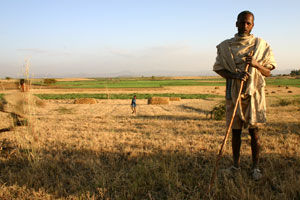
Ethiopian farmers are now painted as part of the problem, rather than a potential solution. - BAKO, Ethiopia/JOHANNESBURG, Nov 12 (Reuters) – For centuries, farmers like Berhanu Gudina have eked out a living in Ethiopia’s central lowlands, tending tiny plots of maize, wheat or barley amid the vastness of the lush green plains.
Now, they find themselves working cheek by jowl with high-tech commercial farms stretching over thousands of hectares tilled by state-of-the-art tractors — and owned and operated by foreigners.
With memories of Ethiopia’s devastating 1984 famine still fresh in the minds of its leaders, the government has been enticing well-heeled foreigners to invest in the nation’s underperforming agriculture sector. It is part of an economic development push they say will help the Horn of Africa nation ensure it has enough food for its 80 million people.
Many small Ethopian farmers do not share their leaders’ enthusiasm for the policy, eyeing the outsiders with a suspicion that has crept across Africa as millions of hectares have been placed, with varying degrees of transparency, in foreign hands.
“Now we see Indians coming, Chinese coming. Before, we were just Ethiopian,” 54-year-old Gudina said in Bako, a small farming town 280 km (170 miles) west of Addis Ababa. “What do they want here? The same as the British in Kenya? To steal everything? Our government is selling our country to the Asians so they can make money for themselves.”
Xenophobia aside, a number of organizations — including the foundation started by Microsoft billionaire Bill Gates — argue that Africa should support its own farmers.
“Instead of African countries giving away their best lands, they should invest in their own farmers,” said Akin Adesina, vice president of the Nairobi-based Alliance for a Green Revolution in Africa (AGRA). “What’s needed is a small-holder, farmer-based revolution. African land should not be up for garage sale.”
FOOD FOR THOUGHT
Both sides of the debate agree on this much: a stark reality — underlined by last year’s food price crisis — looms large over Ethiopia and beyond. The world is in danger of running out of food.
By 2050, when its population is likely to be more than 9 billion, up from 6 billion now, the world’s food production needs to increase by 70 percent, according to the United Nations Food and Agriculture Organisation.
In Africa, which for a variety of reasons was bypassed by the Green Revolution that transformed India and China in the 1960s and 1970s, the numbers are even more bleak. The continent’s population is set to double from 1 billion now.
In all, the FAO says, feeding those extra mouths is going to take $83 billion in investment every year for the next four decades, increasing both the amount of cultivated land and how much it produces. The estimated investment for Africa alone is $11 billion a year.
For deeply impoverished Ethiopia, sub-Saharan Africa’s second-most populous nation after Nigeria, even a fraction of those sums is unthinkable.
Yet with 111 million hectares — nearly twice the area of Texas — within its borders, the answer, in the government’s eyes, is simple: Lease ’spare’ land to wealthy outsiders to get them to grow the food. One unfortunate consequence of that thinking is Gudina and his little plot of maize are painted as part of the problem, rather than a potential solution.
“The small-scale farmers are not producing the quality they should, because they don’t have the technology,” said Esayas Kebede, head of the Agricultural Investment Agency, a body founded only in February but already talking about offering foreign farmers 3 million hectares in the next two years.
“There are 12 million households in Ethiopia. We can’t afford to give new technology to all of them,” he said, sitting in an office adorned with maps showing possible sites for commercial farms.
Indian agro-conglomerate Karuturi Global, whose involvement in Ethiopia so far has been exporting cut-flowers to Europe, has taken the hint, branching out into food production with a sprawling maize farm in Bako. Unlike with similar land deals elsewhere in Africa, the company insists crops will be exported only after demand is met in Ethiopia — where 6.2 million people are said to be in need of emergency food aid because of poor seasonal rains.
“Our main aim is to feed the Ethiopian people,” Karuturi’s Ethiopia general manager, Hanumatha Rao, told Reuters, sitting under an awning at the Bako farm as hundreds of labourers harvested maize in the fields stretching up nearby hillsides. “Whatever we produce will go to the stomachs of the Ethiopian people before it goes to the international market.”
ANOTHER AFRICAN REVOLUTION
While many governments have been busy courting foreigners, in most cases from Asia or the Middle East, to increase Africa’s food output, small farmers like Gudina are not totally without friends.
An initiative backed by the Melinda and Bill Gates and Rockefeller foundations is aiming to kick-start an African Green Revolution, carefully avoiding the pitfalls that had engulfed previous such attempts.
In particular, Africa boasts a dazzling array of soil types, climates and crops that have defied the one-size-fits-all solution of better seed, fertilizer and irrigation that worked in Asia half a century ago.
Its perennial tendency to corruption and official incompetence has also played its part in keeping average grain yields on the continent at just 1.2 tonnes per hectare, compared with 3.5 tonnes in Europe and 5.5 tonnes in the United States.
AGRA’s Adesina says sub-Saharan governments are slowly realising the importance of small farmers, who account for 70 percent of the region’s population and 60 percent of its agricultural output. But he urges governments to make good on a pledge six years ago to raise farm spending to 10 percent of their national budgets.
For its part, AGRA is pouring money into research institutes from Burkina Faso in the west to Tanzania in the east to breed higher yielding and more drought- and pest-resistant strains of everything from maize and cassava to sorghum and sweet potato.
Activists worried about African land grab
BY SAEED SHABAZZ -STAFF WRITER- | LAST UPDATED: DEC 21, 2009 – 9:19:54 AM
NEW YORK (FinalCall.com) – A large and enthusiastic crowd recently gathered in the atrium at York College in Queens for a round-table discussion about the “New Scramble for Africa.”
The Dec. 12 event was sponsored by the Institute of the Black World 21st Century, under the leadership of Dr. Ron Daniels and his wife Mary France-Daniels, and the World African Diaspora Union chaired by former Ambassador Dudley Thompson of Jamaica.
The York College forum is a continuation of the work by Institute for the Black World and World African Diaspora Union to forge mutually beneficial bonds amongst people of African descent by encouraging Pan Africanism, which essentially calls for Black efforts to support Africa and each other regardless of geographic locale. Both organizations work diligently in building bridges to promote operational unity between the Black community and continental Africans.
Presenters included Dr. Shelby F. Lewis, professor emeritus, Clark Atlanta University; Dr. Chika Onyeani, a former Nigerian diplomat, newspaper editor and widely recognized advocate of Pan Africanism; Sidique Wai, president of the New York-based United African Congress, an organization that works to preserve and promote the image, heritage and culture of the African continent; Dr. Leonard Jeffries, professor at the City University of New York in the Africana Studies Department and a Diaspora Union vice president; Dr. Adelaide Sanford, a Pan African educator who serves as vice chancellor of the New York State Board of Regents; and Amb. Thompson.
The overview for the dialogue was presented by Dr. Lewis, who serves as an African adviser and consultant to the Diaspora Union. She began by explaining the legacy of imperialism, slavery and colonialism and how these institutions played a role in the modern day “scramble for Africa” to acquire her resources.
“It started back in ancient times, with the theft of Africa’s intellectual property,” Dr. Lewis said, adding, “Again African people are pawns in the scramble for their gold and diamonds. But, more important is the scramble for Africa’s hottest commodity today, Africa’s farmland.”
Dr. Lewis pointed a finger directly at the government of China as a leading nation leasing African farm land. “What is in it for Africans?” she asked.
Critics say the Asian nation has grabbed huge amounts of Africa’s natural resources while at the same time dumping cheaply manufactured products and indulging in an unequal trade policy.
China is not alone in the African farmland grab. The United Nations Food and Agriculture Organization, in May, reported that since 2004, over one million acres of African land has been allocated to foreign entities.
“Most of the land claimed by foreign acquisition was already in use by local people, who were mostly driven out. The results are disheartening as people end up in over-populated urban centers,” the report said. In June, news stories circulated accusing India of “neo-colonialism” in Africa, joining China, Saudi Arabia, South Korea and several Arab nations. These nations are being called “food pirates” who use African land to grow crops such as rice, sugar cane, maize and lentils for domestic markets.
“We sit on gold and yet we are begging for gold,” said Mr. Wai. He echoed Dr. Lewis’ observation that some of African nations leasing farmland are receiving international food aid and the agriculture output of African farmers is the lowest in the world.
Dr. Lewis, Mr. Wai and Amb. Thompson, accused African leaders of mortgaging the continent’s future. “In a sense we in the Diaspora have to go and rescue Africa,” Amb. Thompson said.
Dr. Jeffries told the audience the institute’s call to create a think tank must be further developed. “Africans all over the world are asking where is our plan?” he said. “We can put together our own $100 billion plan. Do not sit here and look at the Chinese action as a negative; they do what they do. We are in the best place we can be strategically. What are we going to do?”
“What we are going to do is recommend that a committee be created to develop a preamble and statement of guiding principles for African nations entering into contracts with foreign powers for the utilization of land and resources,” Dr. Daniels told The Final Call.
The goal is to “offer principles which ensure that the vast wealth and resources of Africa are used first and foremost for the development of the people and that contracts for the use of land and resources are based on fair and equitable exchange of value,” he said.
———————————
Alamudis and Melese’s pretext to Sell the land nationalized from the farmers .
Ethiopia leases land for agriculture to earn foreign exchange
Bloomberg | 10 November 2009
By Jason McLure
Nov. 10 (Bloomberg) — Ethiopia plans to lease 3 million hectares (7.4 million acres) of land to foreign and domestic investors for agriculture over the next three years to increase productivity and earn foreign exchange, the government said.
The state has already leased land for 15 birr (U.S. $1.19) per hectare per year in some parts of the country in an effort to attract foreign investment, said Eyesus Kebede, an agricultural-investment coordinator in the ministry. The government is also attempting to woo investors by offering incentives such as grace periods on payment.
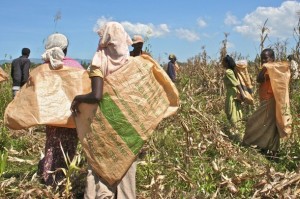
“There is ample amount of land which is not cultivated yet,” Eyesus said in an interview in his office in Addis Ababa, the capital, yesterday. “We are preparing the land and we have given the comprehensive support for the agricultural investors.”
Foreign investment in agriculture in Africa has drawn criticism from aid groups, including Oxfam International, that are concerned about the use of farmland to produce food for export from countries with widespread hunger. In Ethiopia, an estimated 13.7 million people, about one-sixth of the population, are dependent on foreign food aid.
Eyesus said such concerns were outweighed by the plantations’ capacity to bring foreign exchange and technology into the Horn of Africa country, as well as creating employment.
Among foreign investors that have acquired land in western Ethiopia are Karuturi Global Ltd., an Indian food processor, and Saudi-based billionaire Sheikh Mohammed al-Amoudi, Eyesus said.
Regional governments have already transferred 1.7 million hectares of land to Ethiopia’s central government and surveyors are in the process of delineating additional land, he said.
Feather Dresses
Among the land currently being advertised on the ministry’s Web site is 180,625 hectares along the Omo River in southern Ethiopia. South Omo Zone, as it is known, is home to pastoralists from the Hamer, Dasenech and Gnangatom ethnic groups, many of whom still dress in feathers and leather garments and are considered among the world’s most threatened indigenous people, according to Survival International, a London-based group that campaigns on behalf of ethnic groups.
Eyesus said the land in South Omo was “empty” and that the government had taken environmental and social considerations into account when allocating land for investors.
“The people and the local governments are very happy,” he said. “We have not seen any conflict between investors and the community.”
———————————————————————–
Wealthy nations outsource crops to Ethiopia’s farmland
Trend is driven in part by last year’s global food crisis

Two managers (second from left, center) with Karuturi, an Indian company with commercial farms in Ethiopia, checked the corn harvested by workers at Karuturi’s farm in Bako, Ethiopia. (Food/Africa Reuters/ Barry Malone)
BAKO, Ethiopia – In recent months, the Ethiopian government began marketing abroad one of the hottest commodities in an increasingly crowded and hungry world: farmland.
“Why Attractive?’’ reads one glossy poster with photos of green fields and a map outlining swaths of the country available at bargain-basement prices. “Vast, fertile, irrigable land at low rent. Abundant water resources. Cheap labor. Warmest hospitality.’’
This impoverished and chronically food-insecure Horn of Africa nation is rapidly becoming one of the world’s leading destinations for the booming business of land leasing, by which relatively rich countries and investment firms are securing 40- to 99-year contracts to farm vast tracts of land.
Governments across Southeast Asia, Latin America, and especially Africa are seizing the chance to attract this new breed of investors, wining and dining executives, creating land-leasing agencies and land catalogs to showcase their offerings of earth. In Africa alone, experts estimate that about 50 million acres – roughly the size of Nebraska – have been leased in the past two years.
The trend is driven in part by last year’s global food crisis. Relatively wealthy countries are shoring up their food supplies by growing staple crops abroad. The desert kingdom of Saudi Arabia, for instance, is shifting wheat production to Africa. The government of India, where land is crowded and overfarmed, is offering incentives to companies to carve out mega farms across the continent.
Increasingly, though, purely profit-seeking companies are snatching up land, making a simple, if somewhat grim, calculation. As one Saudi-backed businessman here put it, “The population of the world is increasing dramatically, so land and food supplies will be short, demand will be higher, and prices will rise.’’
The scale and pace of the land scramble has alarmed policymakers and others concerned about the implications for food security in countries such as Ethiopia, where officials recently appealed for food aid for about 6 million people as drought devastates parts of East Africa. The UN Food and Agriculture Organization is in the midst of a food security summit in Rome where some of the 62 heads of state attending are to discuss a code of conduct to govern land deals, which are being struck with little public input.
“These contracts are pretty thin,’’ said David Hallam, a deputy director at the UN organization. “You see statements from ministers where they’re basically promising everything with no controls, no conditions.’’
The harshest critics of the practice conjure bleak images of poor Africans starving as food is hauled off to rich countries. Some express concern that decades of industrial farming will leave good land spoiled even as local populations surge. And skeptics also say the political contexts cannot be ignored.
“We don’t trust this government,’’ said Merera Gudina, a leading opposition figure here who accuses Prime Minister Meles Zenawi of Ethiopia of using the land policy to hold on to power. “We are afraid this government is buying diplomatic support by giving away land.’’
But many experts are cautiously hopeful, saying that big agribusiness could feed millions by industrializing agriculture in countries such as Ethiopia, where about 80 percent of its 75 million people are farmers who plow their fields with oxen.
“If these deals are negotiated well, I tell you, it will change the dynamics of the food economy in this country,’’ said Mafa Chipeta, the UN group’s representative in Ethiopia, dismissing the worst-case scenarios. “I can’t believe Ethiopia or any other government would allow their country to be used like an empty womb. The human spirit would not allow it.’’
Few countries have embraced the trend as zealously as Ethiopia, where hard-baked eastern deserts fade into spectacularly lush and green western valleys fed by the Blue Nile. Only a quarter of the country’s estimated 175 million fertile acres is being farmed.
Desperate for foreign currency, the government of former Marxist rebels who once proclaimed “land to the tiller!’’ has set aside more than 6 million acres for agribusiness. Lured with 40-year leases and tax holidays, investors are going on farm shopping sprees, crisscrossing the country on chartered flights to pick out their swaths of Ethiopian soil.
Indian companies have committed $4.2 billion. Anand Seth, director general of the Federation of Indian Export Organizations, described Africa as “the next big thing’’ in investment opportunities and markets.
As he stood on a little hill overlooking 30,000 acres of rich, black soil, Hanumantha Rao, chief general manager of the Indian company Karuturi Agro Products, agreed. He said the Ethiopian government has imposed few requirements on his company.
“From here,’’ Rao said, “you can see the past and the future of Ethiopian agriculture.’’
From there it was possible to see a river designated for irrigating cornfields and rice paddies; it is no longer open for locals to water their cows. Several shiny green tractors bounced across the 6-mile-long field where teff, the local grain, once grew.
——————–
——-

